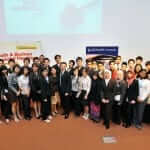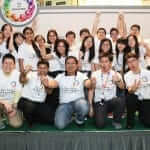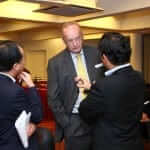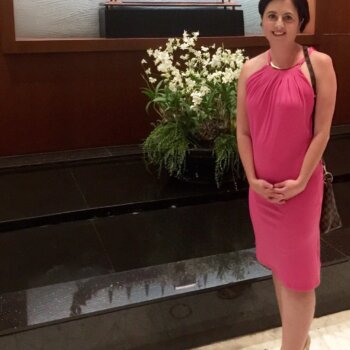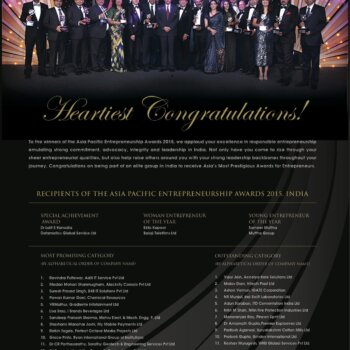Michael Reyes, the founder and CEO of MoneyTree Asia Pacific Ltd, Southeast Asia’s largest financial literacy training provider, is a serial entrepreneur. Michael had been inspired to start his own business as a child. While he pursued his education in Economics at the Universiti Kebangsaan Malaysia (UKM), he had further developed his business acumen by starting his very own tutoring business at the young age.
Upon graduation, enamoured by the advertising world, which offered an attractive opportunity to work with independence, creativity, energy and the appealing prospect to contribute to clients’ business growths, Reyes then joined the quick-paced world of advertising. While Reyes continued to rake in profits for his agency by developing and growing an entire suite of new businesses for his agency, his relentless inquisitiveness about successful business models and fiery entrepreneurial spirit began to prod him to further explore. Armed with the newfound capital and enthused the idea of owning a business, Reyes then returned to advertising, this time with his own start-up. The business flourished and broke even by the second year and grew by the third year.
In 1996, Reyes met a young Polish entrepreneur and following that, was invited to visit Poland. During his six-week stay, Reyes realized that there were tremendous opportunities presented by the emerging economy of post-communist Poland. Reyes had then seized the opportunity to start an import-export business. The business became expectedly lucrative.
In the following year, Reyes’ passion for exploring the underwater world took him to his next venture. He had met an accomplished entrepreneur during one of his diving expeditions, which led to them to partner up to set-up a 3D animation studio. With the partner moving to Australia in 2002 to become a Venture Capitalist in Australia, the relationship now involves them meeting and discussing MoneyTree’s strategies.
In 2007, while the global Recession was beginning to form, Reyes had begun to notice a severe lack of financial literacy in children and youths. News of families who were destroyed because they have lost their homes, and the rampant rise of unemployment had plagued Reyes who had always kept a close eye on the global economy. By then, Reyes had noticed a severe lack of financial literacy in children and youths in education systems around the world. He began to incubate the notion of businesses with purpose; a business that would equip children and youths with the tools and knowledge for a better financial future.
Reyes, with the belief that education has the power to positively change the world, and a determination to create an impactful change for the society, started Moneytree Asia-Pacific in Malaysia in 2008 and subsequently MoneyTree Borneo and Singapore a year later. MoneyTree’s financial-literacy education system was created to address the gap in financial literacy in the education system. Its secondary objective was to gestate the next generation of entrepreneurs who will be engines for innovation, wealth creation and ultimately, sustainable economic development for the communities it serves.
What do you guys do at MoneyTree?
MoneyTree was set up to provide financial literacy amongst school children using the concept of ‘learning through play,’ fulfilling a gap in the marketplace for essential financial education for children and youth for a better future. MoneyTree provides financial skill and knowledge to youths aged 7 – 22 , which would be required to build a career or business, as well as plan for their financial freedom.
How did MoneyTree begin?
The idea was born out of Reyes’ observation of the great need for financial knowledge and boundless opportunities for wealth creation in Asia. Understanding that it would be exponentially more impactful to shape minds of children and youth, rather than adults, Reyes looked towards education as a natural “solution” to address the challenges of a rising Asia.
Could you walk us through the process of starting up MoneyTree?
Three of the original founders of MoneyTree Asia Pacific were in Hong Kong to attend a business meeting. In that meeting, it was decided that a business with a purpose would be started and thus MoneyTree was born with the objective of equipping children with the necessary tools for life by providing financial education that is delivered in a fun manner.
In 2008, MoneyTree Asia Pacific starting intensively testing for the perfect teaching methodology to deliver financial education to children in a way that they could understand, while also teaching them other necessary skills that was crucial but missing from the existing education system such as presentation and public speaking skills. As a result of the testing, the result that emerged pointed unmistakably to the fact that there is one crucial factor that would accelerate a child’s ability to learn. That key component is FUN. Making learning fun then became the criteria upon which all MoneyTree’s content was developed.
To enhance the credibility of the programme, Reyes then sought the validations and certifications from various governmental institutions and leading institutions of higher learning to accredit MoneyTree programmes. The support of the governmental organizations such as Ministries of Education and the partnerships from top institutions of higher learning in would also eventually contribute to amplify the importance of financial education to Asian parents.
Armed with the relevant certifications, Reyes then started gathering the talent necessary to propagate the purpose of MoneyTree forward in the region. Once he had built his team, he then set up MoneyTree Malaysia and Singapore was set up. Three of the original founders hold equity and key positions in MoneyTree Asia Pacific today, guiding the Asia Pacific team to achieve the MoneyTree vision.
How have you been growing MoneyTree?
The fundamental belief has always been that three components had to be in place in order for MoneyTree to grow in the early years:
-
Purpose – every MoneyTree programme is developed must be a relevant solution to important challenges existing in our communities.
-
People – the right team.
-
Partners – the right strategic partners to expand both reach and brand awareness.
In terms of talent, MoneyTree has always focused on eeking out individuals who believe in the company’s purpose as well as possess the drive to increase its reach.
Through the years, the approach has been to grow MoneyTree by aligning the company to top corporate partners as well as governmental agencies which share the vision, mission and market aspirations.
What was the biggest challenge starting up? How did you overcome it?
Because of its unique approach towards talent acquisition, some of the biggest challenges for MoneyTree has always been about hiring the right talent. In its early years, much of the problems faced revolved around having key team members who either worked on a personal agenda rather than advancing the company’s purpose or created conflict amongst team members creating disharmony. Dismissal with compensation seemed the only workable solution.
Also, in the early days, the initial stages saw the company bleeding cash more than having excess. Working on raising capital by means of injection from shareholders and increasing sales activities were the main approaches employed.
What is one strategy that you believe has helped grow your business?
There isn’t a SINGLE strategy that can be attributed to the successful growth of the company. However, the biggest contributing factor to MoneyTree’s success was the tireless passion and dedication, as well as the bond amongst the core management team. I also saw that it was important for all members of the management team to trust in each other’s abilities as well as to be open to address the weaknesses that existed.
In what aspect has your business grown most, in your opinion?
Yes, MoneyTree has recorded a revenue of RM10 million for its Singapore and Malaysia operations this year.
The biggest growth that can be seen is in the area of the collaborative effort with key partners. Today, more than ever before, MoneyTree is able to call on and work with different partners from the different but relevant sectors to pursue the attainment of its goals.
Have you developed any industry insights that you could share?
The industry in which MoneyTree is involved is education, in which Financial Literacy remains an key area of specialization. Over the years, what became visible is that there are more people who resist change within the industry than those that promote positive transformations.
In an industry where the main desired outcome is preparing the current generation for an ever changing business landscape that would form their future, resistance to change is a contradictory to the idea, and counter-productive to for its goals.
Hence, one pursuing any ambitions within this industry that involves constant change, must have the patience and tenacity to ride through a long journey of challenges which will arise from legacy systems and legacy thinking.
Do you find the industry is different from the West? If so, how so?
Culturally, it can be said that the target audience ( in this case, children and youth), differ vastly in behavior. Generally, Asians are less expressive, and less vocal than their Western counterparts. In an increasingly globalized arena, it is important to equip the children and youth with the fundamental skills that will increase their individual competitiveness and progress against a fast-evolving business landscape.
In terms of structure, while there remains a lot of similarities in terms of teaching methods and assessments, there has been visible changes in certain Asian countries as Governments start to recognize the need to adapt education systems, content and delivery to meet current market requirements.
What is your approach towards managing your team and human capital needs?
Values, talent and experience are three things MoneyTree looks for when selecting its team members and leaders. Once the right candidate has been selected for the task, the individual must be given adequate support to improving his/her knowledge and some liberties to conduct the job/task as he/she may deem fit.
The team must be operate within a positive environment, therefore a positive attitude from all team members and great drive are musts. Hence when an individual stops displaying either or both, that individual must be removed from the team or not recruited at all.
If you could start all over again, would you change anything about your approach? If so, what?
Yes. The two main things that I would have changed would be my approach towards People and Equity.
In terms of people – in the early years, there was less attention paid to who was taken in as a Shareholders, Directors and Employees. We should have been more selective in our decisions and committed more time to finding the right team.
Also, in the early stages, equity was offered or given out too easily, as such, it was not given the level of appreciation that it deserved. This ultimately led to problems in terms of making key decisions on the direction of the company
What is your thoughts on being an Asian entrepreneur?
Asian entrepreneurs, in the past, had less access to capital. Today, the scenario has changed, as capital is far more available from governments and independent investors.
I think Asian entrepreneurs do not receive as much attention as their US counterparts, and although this is changing, it would still take some time before they will be regarded as ‘equals.’ However, the Asian entrepreneur, if successful, will be regarded as one who stood against the odds and triumphed – and that itself would be an ‘inspiration’.
What is one market trend that really excites you?
Mobile technology, its widening usage and the lowering of access to it. This provides great opportunities for those who wish to learn on the move as well as those who wish to ‘teach’ in a whole new way.
What is one habit that makes you a more productive entrepreneur?
The need to get things done, effectively and within the lowest financial and social cost possible.
Why did you decide to become an entrepreneur?
I had always believed that the only way to ascertain a great future is to create it.
What do you think are the most important things entrepreneurs should keep in mind?
-
Opportunities are everywhere. Deciding on which ones you are most prepared to take on at that point in time, makes a world of difference.
-
No person does it all on their own. A great team brings out the best in you.
-
Money isn’t everything, but almost everything has to do with money. Ensuring that you have enough to go on at all times, ensures you make the Right decisions most of the time.
-
Never replace working hard with working smart. They were meant to be compatible, not interchangeable. Hard work is a measure of one’s drive, ‘Smart’ work measures one resourcefulness.
In your opinion, what are the keys to entrepreneurial success?
Having a workable idea that serves an underserved market, that has been carved into a business model that is both scalable and easily deployable, well funded to last the distance, marketed creatively and aggressively to as wide an audience as possible, putting together a team that is driven, progressive and skilled to take the business to greater heights.
Any parting words of wisdom for entrepreneurs out there?
Do what you love because that would provide you with the drive and tenacity to achieve more. But it is also important to remember to not get too attached to a specific business that you can’t cut it loose if it’s drowning you.
What is the future of MoneyTree?
MoneyTree aims to be Asia’s most prominent Financial Literacy education provider that will utilize cutting edge technology to create a learning environment that is true-to-life and absolutely fun filled.
The future of MoneyTree would see more students in different countries being involved hands-on in learning about financial matters as well as creating opportunities for themselves.
Connect
Website: http://www.moneytree.asia
Facebook Page: https://www.facebook.com/MoneyTree.Malaysia
Email: [email protected]
LinkedIn: http://www.linkedin.com/company/moneytree-malaysia/







